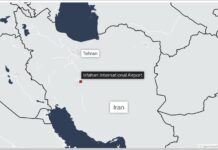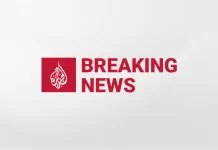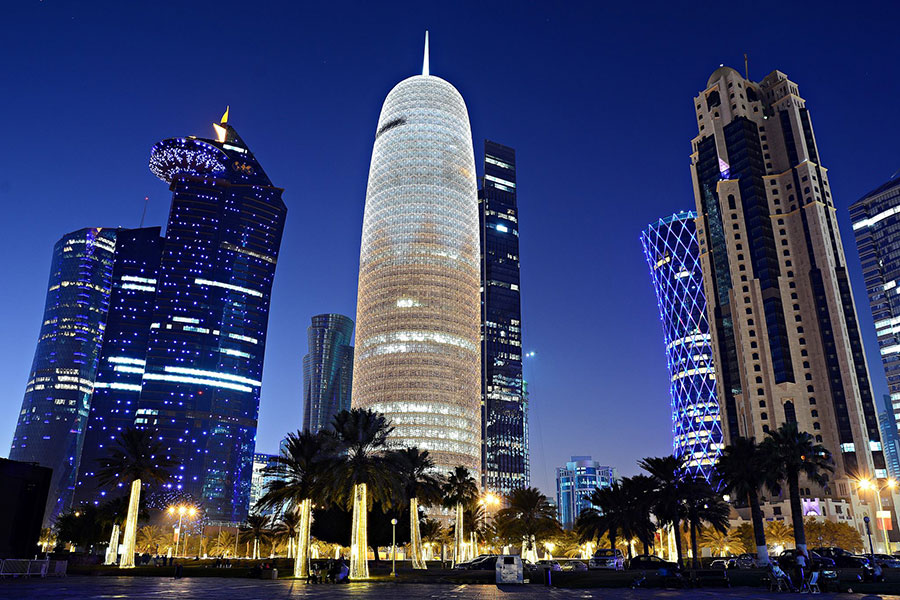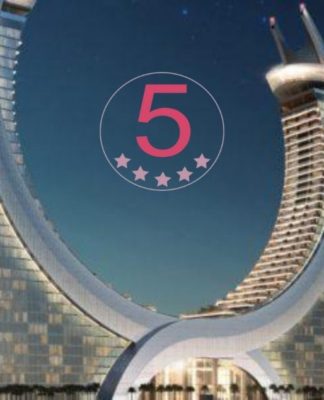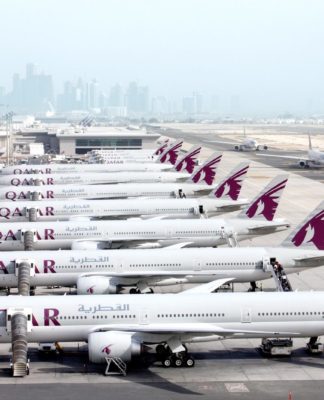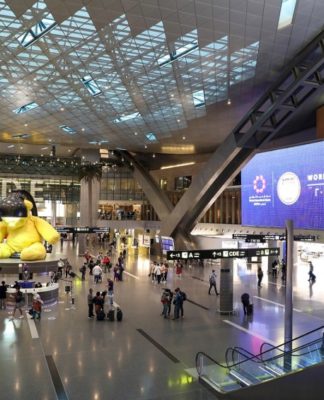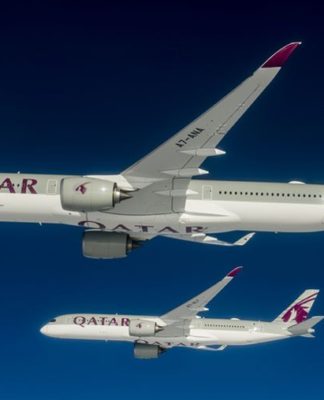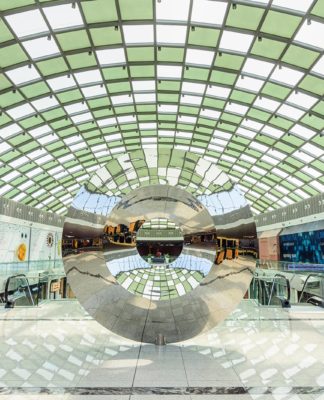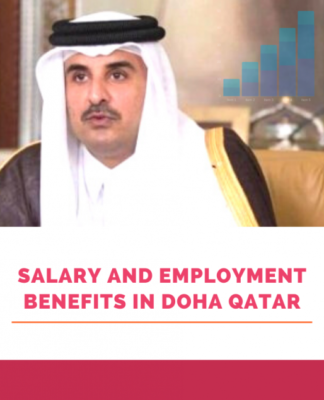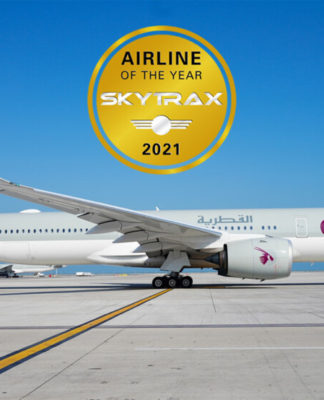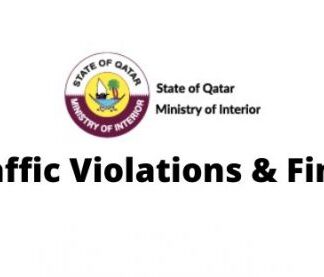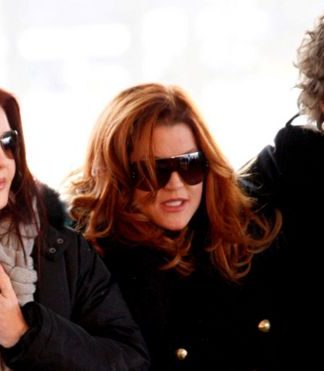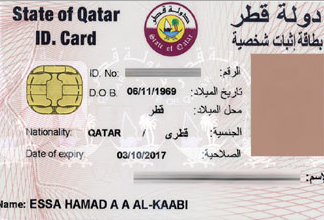All About Qatar
This article is for 2002 and some information is old.
QATAR
State of Qatar
Major City:
Doha
» Introduction:
QATAR , a fully independent sovereign Arab state on the western shore of the Persian Gulf, was a protectorate of the United Kingdom for 75 years before proclaiming its autonomy in 1971. It had been inhabited for many centuries, as early as 4,000 B.C., and had existed under the dominance of Bahrain and the occupation of the Ottoman Turks. At the beginning of World War I, Great Britain expanded custody of Qatar, promising to protect it from all aggression by sea, and to lend its good offices in case of land attack.
High-quality oil was discovered in 1939, but exports were delayed by the second World War. During the 1950s and 1960s, gradually increasing oil income brought economic prosperity, social progress, and the beginning of modern industry. In 1968, Qatar attempted to form a federation with neighboring Gulf countries, Bahrain and the Trucial States (the present United Arab Emirates). Attempts to agree on the terms of the union failed. In September 1971 Qatar decided to become a separate entity known as the State of Qatar. (The name sounds like “cotter.”)
» Major City:
Doha
Doha’s 2000 population is about 355,000 and growing. Most have arrived in the past 15 years, as the city has expanded at an incredible rate. Although generally well maintained by municipal authorities, the city has grown faster than its basic infrastructure, resulting in a large number of ongoing renovation projects (roads, sewers, telephone cables, etc.).
Privately funded residential and office building construction is found throughout the city. Notwithstanding this large-scale development around the capital, a shortage of reasonably priced, Western-style housing persists. The majority of new living units are large, poorly designed (and expensive) European-style “villas,” with high perimeter walls and very small interior gardens.
Once a sleepy seaport, Doha has come a long way since the oil boom of the mid-1970s. The modern skyline now includes a number of multistory buildings that contrast sharply with the flat, rocky plains surrounding the city. Many of the older buildings are being torn down and replaced, especially in the old “souk” area of the city center.
Streets in the old section of the city are narrow and congested, but a system of wide, high-speed parkways links the newer, suburban areas. Very few open spaces are found in the city center, but a 7-kilometer-long park system along the waterfront Corniche offers agreeable vistas and a place to walk or jog and is a popular gathering spot in the cooler months. In addition, a limited number of public parks and museums are located around the city, including the attractive Doha Zoo, the National Museum, Doha Fort, Khulaifat Park, Muntaza Park, the Airport Park, and Aladdin’s Kingdom, a Western-style amusement park. Mosques appear in every neighborhood; one is never more than a few blocks from an impressive example of Muslim architecture.
» Food:
With the exception of fresh fish, some chicken, and seasonal, locally grown produce (cucumbers, tomatoes, melons, etc.), all food consumed in Doha is imported. Although poor supermarket inventory management results in frequent shortages, overall selection among the various retail outlets is good. U.S.-style one-stop shopping may be impossible, but one can usually find everything one needs to feed an American family. Several modern supermarkets offer a variety of fresh and frozen meat, frozen poultry, canned goods and frozen foods, some from the U.S. but most from Europe, the Middle East, and Australia.
A wholesale produce market on the outskirts of the city sells imported fruits and vegetables at Washington, D.C., area prices. An adjoining fish market offers a good selection of fresh, reasonably-priced fish and shellfish. Dairy products, including fresh and “shelf life” milk, cheese, yogurt, cream, and butter, are available at most local retail outlets. Both imported and locally manufactured soft drinks are available at reasonable prices. Local bakeries produce various types of bread, rolls, pies, and cakes; however, the quality is not quite up to U.S. standards.
Alcoholic beverages are available but carefully rationed and controlled. Using a ration card issued by the British Embassy, one can only purchase liquor once per month up to QR 500 (about $137) per family. Prices include importation duty and are very close to U.S. retail prices for similar items.
» Clothing:
For 4 to 5 months of the year, Doha’s temperatures exceed those of the hottest August days in Washington, D.C. Cotton and other cooler fabrics for both women and men are essential during this period. For 2 to 3 months in winter, it is cool enough for light jackets and woolen clothing in the evenings. Good-quality clothing is about twice the cost in Doha as in the U.S. By contrast, the local fabric market is reasonably priced, and local dressmakers and tailors can be hired to custom-make clothing items for significantly less than retail outlets charge for premanufactured items. However, the abilities of local tailors and dressmakers vary widely, and custom-made clothing can be a hit-or-miss proposition.
Men: Because many offices and homes are centrally air-conditioned, lightweight suits and jackets are comfortable for office and evening wear. For informal occasions, slacks and sport shirts are appropriate.
Dress shoes and some fashionable men’s clothing are available in Doha. English and continental shoes average $200 to $300 a pair. American shirts, ties, socks, underwear, and pajamas are available, but again at very high prices. Continental suits are sold for $700 to $900 and sport coats for $350. Occasionally, a reasonably priced suit or jacket is found at one of the local shops, though apparel stocked locally is inferior by U.S. standards. Even if the price is right, fit and size can present problems. Tailor-made suits and shirts are more affordable, but great care must be exercised in choosing a tailor and explaining the design requirements.
Women: Although Qatari women wear the traditional, ankle-length black cloaks (abayas), Western women wear regular Western dress. Knee-length and mid-calf-length dresses and skirts are preferable, as very short dresses, shorts, and tank tops are considered in poor taste and offend the host country’s religious and cultural principles. Many women have dresses or skirts made locally.
American shoes are typically not available in Doha. European shoes in the latest styles can be purchased, but many Americans have difficulty finding the correct size, and prices are very high. The rough outdoor terrain is very damaging to shoes, and replacements will be needed more often than in the U.S. Shoe repair work is available but not always of good quality.
Children’s clothing is available, but quality and style are uneven, and all items are much more costly than in the U.S.
» Supplies and Services:
Ample supplies of toiletries, cosmetics, shaving supplies, and home medications, mostly European brands, are available at higher than U.S. prices. Pharmacies carry a wide range of prescription and nonprescription drugs, first-aid supplies, and birth control products.
British, French, and some American cigarettes, cigars, pipe tobacco, and smoking accessories are available locally at prices comparable to those in the U.S.
Dry cleaning is available at several retail outlets. A man’s business suit typically costs about $6, a woman’s suit about $4.50. Business hours for dry-cleaning establishments are short, sometimes only a few hours per day.
Hairdressing salons for men and women are adequate by Western standards. A man’s haircut costs $3 to $10, depending on the shop patronized. A shampoo and set, without a cut, costs about $20.
» Religious Activities:
Islam is the only officially sanctioned religion in Qatar, and it is illegal to display crosses and other religious symbols on buildings or in public areas. Likewise, churches and other official places of worship are banned. Unofficially, a variety of Christian worship services are held in private schools and homes, including Catholic, Protestant, and Anglican services. There is a Christian burial ground near Dukhan, about an hour west of Doha.
» Education:
Expatriate schools are available for the American, British, French, Lebanese, Indian, Egyptian, Bangladeshi, Iranian, and Pakistani communities. In 1988, Doha’s American International School (AIS) was founded as an independent, coeducational private school. AIS offers an American-style educational program for students of all nationalities, from kindergarten through grade 12. AIS receives grant money from the Department of State’s Office of Overseas Schools (A/OPR/OS). It is accredited by the New England Association of Schools and Colleges, Inc. The school operates on a quarter term system from the beginning of September to the middle of June. The school runs at full capacity with 400 students, about half of whom are American citizens. A new school building has been in the planning stages.
Other local schools include the Doha English Speaking School (DESS), a British-style grade school, and Doha College, a British high school. These schools are sponsored by the British Embassy and follow traditional British educational models, preparing students to pass the qualifying exams that control access to the better public and private schools and colleges in the U.K. Despite differences in goals and methods, the British schools can prepare American children to enter U.S. public schools with their age groups. Supplemental courses in areas beyond the British curriculum, such as U.S. history, must be arranged privately. The schools operate on a trimester basis from September to late June.
» Sports:
Organized athletic events are typically limited to soccer, although a few other sports make an occasional appearance. For those who can afford to join private clubs, a variety of sports are available, including wind surfing, sailing, weight lifting, volleyball, etc. Fishing and boating are popular but expensive. A few bowling alleys are available, both for league play and individual play.
A new championship golf course just north of Doha will open soon. Due to the costs of maintaining grass greens and fairways in the harsh desert climate, membership fees and greens fees are expected to be very high. Two older golf courses already operate in Qatar, both with dirt fairways and oiled sand greens (browns). One is a 1-hour drive west of Doha, and the other is a 40-minute drive south. Membership at either club is less expensive, but may require a wait of several months. A few private tennis and squash clubs operate in Doha. A local rugby club is open to all reasonably skilled players. There is also a scuba club in Qatar.
A number of private clubs with sports facilities, some at hotels, offer individual and family memberships. Typically, these clubs offer swimming, squash, tennis, and weight room facilities. Membership fees are relatively high. The Al-Messilah compound also has a small weight room, a large (25 meter) swimming pool, two squash courts, two tennis courts and several children’s playgrounds. These facilities are free to Al-Messilah residents and their guests.
Aside from the occasional tennis or squash match, soccer football is the only local spectator sport. Local and regional teams compete frequently on Doha’s various public and private soccer fields.
» Touring and Outdoor Activities:
The principal outdoor activity in Doha is the weekend beach trip. The beaches which are easily reached over good roads are too noisy and litter-strewn for most Americans. The more attractive beaches in the North and West are also more remote: most are 1-2 hours away from the city and accessible only by 4 wheel-drive vehicles. The remote beaches offer better privacy and family enjoyment for Westerners. Beachgoers travel in convoys and bring all necessary supplies with them, including food, drinking water, tents, firewood, etc.—all beaches are “primitive” (no shade, fresh water, rest rooms or concessions of any kind). At the Inland Sea south of Umm Said, sand dunes extend to the water’s edge, sheltering mile after mile of beautiful, deserted beaches. However, a trip to the Inland Sea is three hours each way, much of it over salt flats, gravel flats and loose sand. It requires substantial planning and a minimum of 3-4 well-maintained 4-wheel-drive vehicles. Due to the distance involved, many visitors to the Inland Sea camp out overnight and return to Doha the next day.
Doha’s National Museum is among the finest of its type in the Gulf. The facility is a treasure chest of bedouin artifacts, crafts, jewelry, and other works associated with the history of the Qatari people. It also has an aquarium and lagoon, in which local sea life and traditional fishing boats are displayed.
Arabian oryx can be seen at the Doha Zoo and on a farm at Shahaniya. These extremely rare animals were captured elsewhere on the Arabian peninsula to form a breeding herd in Qatar and to help save the strain from extinction.
» Entertainment:
Doha has no western-style bars or nightclubs; public drinking and dancing are prohibited. Private restaurants in the major hotels and in private clubs offer alcoholic beverages to members and paying guests only. All other liquor is sold via a local ration system controlled by the British Embassy. Most evening entertainment is either alcohol-free or takes place in private homes.
An amateur, English language theater group produces several plays every year, including one or more musical productions. There are a few private choral, instrumental and dance groups in Doha, but no city choir, dance troupe or orchestra. The National Folklore Troupe, established to preserve Qatar’s traditional music and dance, presents public performances on holidays and for special events. Qatar occasionally hosts an international sporting event, such as the Qatar Tennis Open in January.
» Social Activities:
Opportunities for charitable volunteer work exist but are limited. Local social services enjoy massive government support. Charities and non-governmental organizations (NGOs) have been virtually nonexistent in the past, but interest in this concept is growing—Qatar’s first NGO, Friends of the Environment, has just been established.
Although Qatar is still a traditional society, opportunities exist to establish rewarding personal relationships with Qatari nationals, both men and women. Cross-cultural ties have been strengthened by the large number of young men who have been sent abroad for higher education. The size and variety of expatriate communities also present excellent opportunities for staff members to develop personal and business relationships.
Source: Encyclopedia





